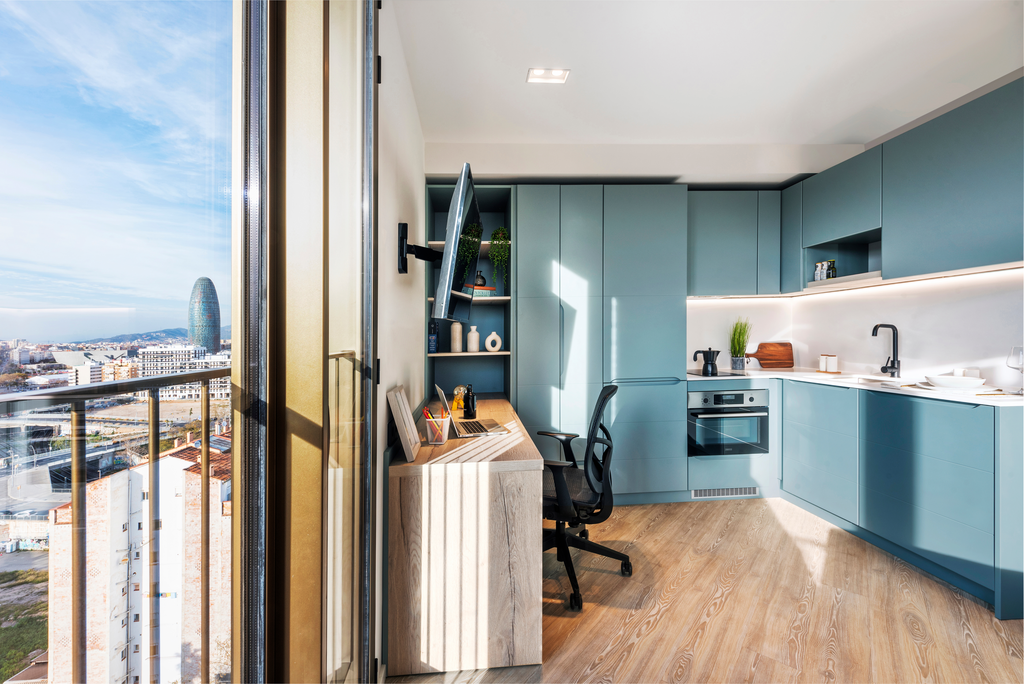With over 200,000 students in the city, the variety of subjects and prestigious universities make studying in Barcelona a great destination for those looking to further their education.
Barcelona has some of Spain and Europe’s most important universities, centres and business schools. Barcelona’s universities are highly ranked internationally for their excellence in research, internationalisation of projects and teaching quality. In fact, UAB, UB and UPF are among the top 250 universities in the world (QS World University Rankings 2023). This may be one of the reasons why they attract so many students from both Spain and the rest of the world. Some are also very close to our Vita Student buildings in Barcelona.

The number of students from the rest of Spain studying in Barcelona (15,779 students) is proportionally much higher than in the rest of Spain. In terms of international students, public universities alone receive around 34,000 students from more than 170 countries.
Barcelona’s universities are world-renowned for their teaching style. If you are studying in Barcelona or are considering it, you will know that the social and cultural aspects of the city are as tempting as the courses on offer. With so many reasons to study in Barcelona, it’s no wonder many international students apply for courses. If you are one of them or are thinking of doing so, we have created this guide to help you understand everything you need to know about studying in Barcelona. In this blog, we explain how to apply to study in Barcelona, what life in Barcelona is like for international students and much more. This is the definitive guide to Barcelona universities for international students.

THE SPANISH EDUCATION SYSTEM
In Spain, children are legally obliged to attend school from age six to 16.
The years of schooling are divided into educational stages:
- Infant stage: from 0 to 6 years. It is provided in “escuelas infantiles”.
- Primary education: from 6 to 12 years. It is taught in “schools”. It goes from the 1st (6-7 years) to the 6th year of Primary Education (11-12 years).
- Compulsory Secondary Education (ESO): from 12 to 16 years. The public centres providing this education are called “institutos” or “IES” – Instituto de Estudios Superiores. If the centre is subsidised or private, it is called “colegio”.
POST-COMPULSORY SECONDARY EDUCATION
Post-compulsory Secondary Education offers a choice between:
- Baccalaureate: from 16 to 18 years of age. A Baccalaureate is split into three different categories of courses; Arts, Science and Technologies and Social Sciences. It is taught in secondary schools or IES.
- Intermediate Vocational Education and Training (FP): from 16 years of age (or 15 in exceptional cases) onwards. This is taught in secondary schools, IES or vocational training centres
HIGHER EDUCATION
Higher education (with different criteria for entry, depending on the course chosen) comprises of:
- University education
- Higher artistic education
- Higher vocational training, higher vocational education in arts and design, and higher vocational education in sport.

PREPARING TO STUDY IN SPAIN
Now that you know a little more about the education system in Spain, let’s look at what it’s like to complete your university studies in Spain. Here’s what you need to know before you apply to study in Spain…
1. FIND A UNIVERSITY AND A COURSE
According to the main international rankings (THE, QS and ARWU-Shanghai), Spanish universities are positioned among the best in the world by discipline.
Studying in Barcelona offers access to world-class universities, many of which are very close to our Vita Student buildings in Barcelona – UPF, ESADE and IESE, to name a few.
When you are looking for a course to apply for, make sure it is right for you by researching thoroughly and reading about what the course entails.
2. FIND OUT ABOUT ADMISSION REQUIREMENTS
The Spanish university system is highly decentralised, and the universities run independently from the government. To study both in Barcelona and the rest of Spain, you should check your chosen institution’s university entrance requirements and admission conditions.
These may vary depending on your country of origin, and you may need to complete other accreditations to meet the requirements to study at your chosen university in Spain. If your chosen city is Barcelona and you come from a foreign education system, you can find all the information you need to apply for admission through the Universities Department of the Generalitat de Catalunya.

3. APPLY FOR YOUR STUDENT VISA
Depending on your country of origin and the length of your stay, you will need a series of documents to live and study in Spain. So that you can make the most of your time at university, check the requirements for obtaining a visa and all the documentation related to your stay in our Spanish visa blog.
As far as language requirements are concerned, it is highly recommended to have a B2 level of Spanish. Certified by the DELE, this diploma certifies the degree of competence and mastery of the Spanish language. Catalan, also an official language in Catalonia, could be a requirement depending on the degree or course you wish to study, and it is common for teaching to be in both languages, so the city offers the perfect opportunity to learn a new language.
On the other hand, many higher education institutions in Spain offer courses and programmes taught in English, so it is possible to study in Spain in English. You can also find programmes taught in English at private or international universities in the country, some of which teach their entire curriculum in English.
There is also a wide range of courses to study in English, both Bachelor‘s and Master’s degrees:
Spanish universities offer a total of more than 800 degrees taught totally or partially in English (English Taught Programs). Of these, 283 degrees have at least 30% of teaching in English, 164 with at least 50% and 80 with 100%. In addition, there are 508 Master’s degrees with at least 30% of teaching in English, 401 with at least 50% and 322 with 100%.

4. DISCOVER FINANCIAL AID OPPORTUNITIES
Although Spain is a country that offers excellent value for money for international students compared to other European countries, before you start dreaming about studying in Barcelona, you need to make sure you have the money to finance your studies.
The annual cost of degree programmes depends on the cost per CTS credit and the total number of credits of the programme you want to study. In the case of Spanish public universities, this can amount to more than 40 euros per credit, depending on whether it is a Bachelors or a Masters degree. Also, bear in mind that the cost per credit increases if you cancel the registration of the programme and register for a second/third time.
On the other hand, the cost of studying in Spain for international students from non-EU countries can be higher and the tuition fees for a degree at one of the many prestigious private universities in Spain are more expensive, depending on the programme and the institution. For this reason, once you have chosen the programme you wish to study, it is a good idea to draw up a budget that includes all these costs and consult possible sources of funding. The Spanish Service for the Internationalisation of Education (SEPIE) has developed a complete scholarship search engine where you can filter according to the type of scholarship and the applicant’s profile.
In addition, many private schools have scholarship programmes or agreements with different banks to offer special payment conditions to their students. Finally, an estimate of your living costs will help you plan your stay with more peace of mind.

SORTING OUT YOUR STUDENT ACCOMMODATION
At Vita Student, we know a thing or two about what makes great accommodation for students, so here are five things to consider when picking your student accommodation.
1. BOOK IT EARLY
Leaving your accommodation to the last minute is a bad idea as it means all of the most cost-effective and best places will have been snapped up.
2. DOES IT HAVE EVERYTHING YOU NEED?
Wherever you choose to stay, it’s important you have a quiet place to study, somewhere to relax, good cooking facilities, and even somewhere to exercise. You’re likely to be living at your accommodation for at least 8 months, so it needs to be perfect.
3. IS IT SECURE?
Ensuring you and your valuables are safe is one of the most basic needs when you’re looking for somewhere to live. When you’re looking for the perfect accommodation, check what security measures are in place. Do they have cameras? Will staff be on-site at all times?

4. WHAT’S THE WI-FI LIKE?
You’ll likely not notice if your internet connection is good, but if your Wi-Fi is slow and unresponsive you won’t be able to ignore it. Whether you’re streaming something online, staying in touch with family back home or just trying to revise, a slow internet connection is painful.
5. WHERE IS IT?
Location is key to having a good time and making the most of university life. If you want to get out and enjoy the nightlife, living far out of the city isn’t going to be helpful to you. Make sure you have a look at what’s near your accommodation before moving in.
All Vita Student accommodation is located centrally, so you can immerse yourself in the city you’re studying in. We also have superfast 250MB internet to help you keep up with work and catch up with family and your favourite shows, 24-hour service to keep you safe and sound, and private study areas for those late-night revision sessions.
Interested in living with us? Discover what life at Vita Student is like here.

Enjoyed this article? we think you should read…
How to prepare to move into Vita Student Barcelona



